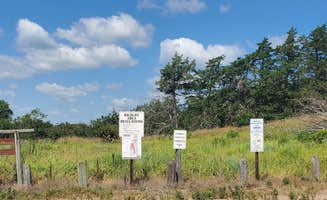Rustic camping near Hanover, Kansas offers opportunities beyond the immediate town boundaries. Predominantly an agricultural region characterized by rolling prairie terrain, the area experiences four distinct seasons with hot summers and cold winters. Seasonal considerations include high humidity during summer months and potential for severe thunderstorms from spring through fall.
What to do
Fishing opportunities: Pottawatomie State Fishing Lake provides multiple fish species for anglers seeking undeveloped shorelines. A Kansas fishing license is required, available through the Kansas Department of Wildlife and Parks. According to Rick M., the area offers a "Beautiful scenery, nice lake" experience.
Wildlife observation: Dawn and dusk offer optimal wildlife viewing times at Pottawatomie State Fishing Lake. Visitors may spot deer, various bird species, and small mammals throughout the undeveloped areas. "Not many insects" contributes to the comfort level when outdoors, as noted by campers.
Star gazing: The minimal light pollution around primitive camping areas creates excellent night sky viewing conditions. Clear nights reveal impressive celestial displays, particularly during meteor showers in August and December. Bring red-filtered flashlights to preserve night vision while navigating camp after dark.
What campers like
Natural seclusion: The undeveloped shoreline areas provide genuine isolation from other campers. "Nice and secluded" environments allow for peaceful experiences even during weekends. The lack of designated sites means campers can select naturally sheltered locations.
Unstructured camping: The absence of formal campground infrastructure appeals to those seeking primitive experiences. No reservation system means spontaneous trips remain possible year-round. "Everything is perfect here" for those seeking minimal development, according to visitor feedback.
Budget-friendly options: No-fee camping makes this area accessible for extended stays. The proximity to small towns allows for supply runs without extensive travel. Campers appreciate the value proposition of free waterfront camping locations.
What you should know
Water planning: No potable water exists onsite, requiring campers to bring sufficient supplies. Standard recommendation is one gallon per person per day, with additional amounts for cooking and cleaning. Some visitors note that having "potable water" would improve the experience.
Waste management: Complete pack-out procedures apply to all trash and waste. No disposal facilities exist onsite. Campers should bring sealable containers for transporting waste back to proper disposal locations.
Fire regulations: While fires are permitted in established rings, changing conditions may trigger temporary restrictions. Check current fire regulations through Kansas Department of Wildlife before trips. Bring only local, certified firewood to prevent spreading invasive species.
Tips for camping with families
Safety considerations: The undeveloped nature requires additional supervision for children near water. No designated swimming areas exist, and shorelines may have unexpected drop-offs. Bring life jackets for any water-related activities.
Activity planning: No playground equipment or developed recreation areas exist. Bring family-friendly activities suitable for primitive settings. Scavenger hunts, star charts, and identification guides for local plants and animals enhance educational opportunities.
Comfort accommodations: The lack of facilities means portable toileting solutions benefit families with younger children. Privacy tents with portable toilets improve comfort for extended stays. Extra tarps provide additional weather protection around camp.
Tips from RVers
Access limitations: While some areas accommodate larger vehicles, most primitive sites best suit smaller setups. Scout locations before attempting to navigate larger rigs into undeveloped areas. Seasonal weather affects ground conditions and may limit access.
Self-contained requirements: The absence of hookups, water, and dump stations necessitates complete self-sufficiency. RVers should arrive with full water tanks and empty waste tanks. Solar panels offer sustainable power solutions for extended primitive stays.
Leveling challenges: Natural clearings rarely provide perfectly level parking. Bring substantial leveling blocks and stabilizers for comfort. The undeveloped terrain may require multiple attempts to find suitable parking locations for any wheeled camping units.


